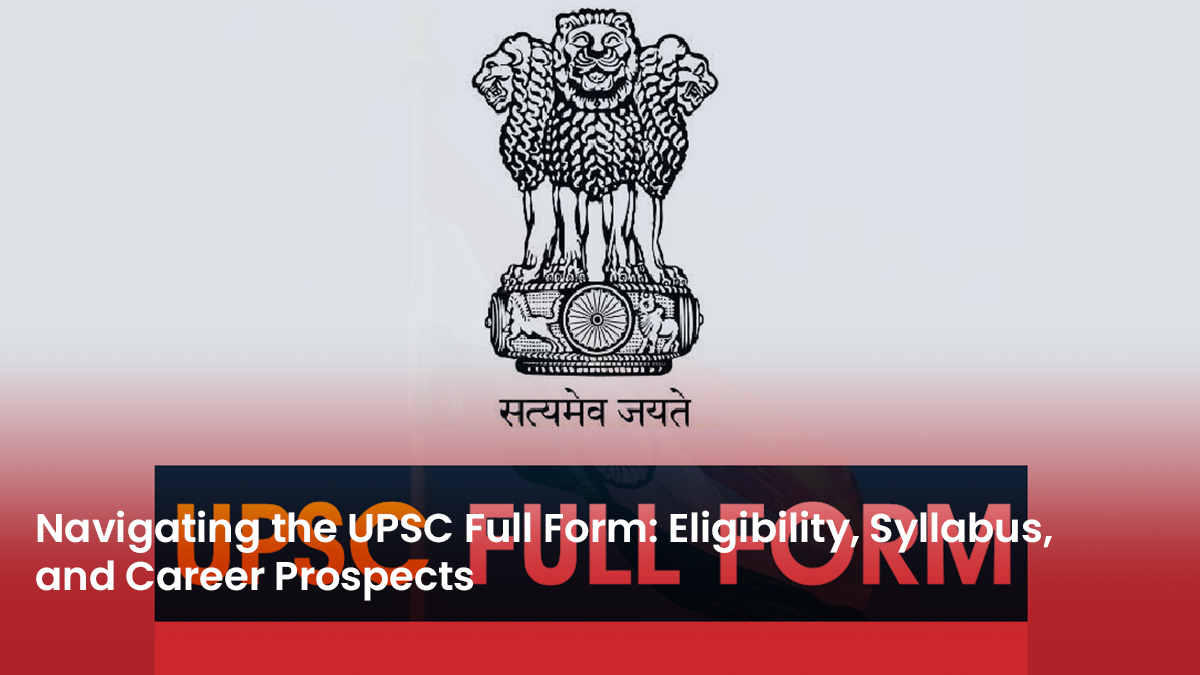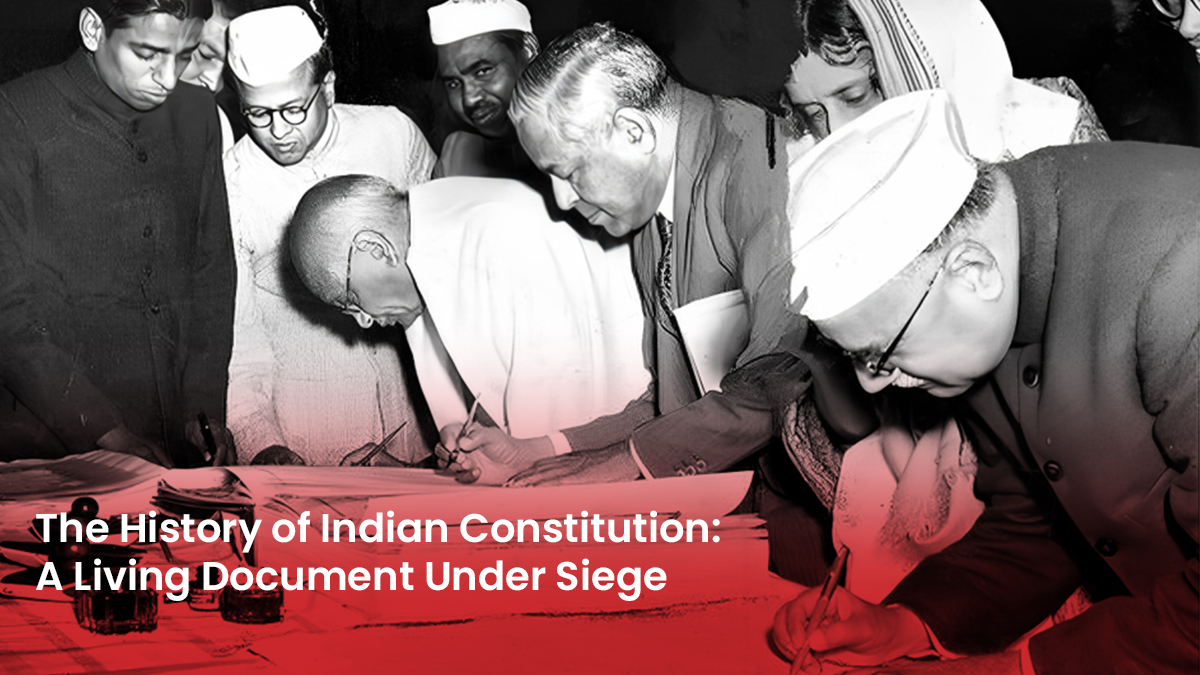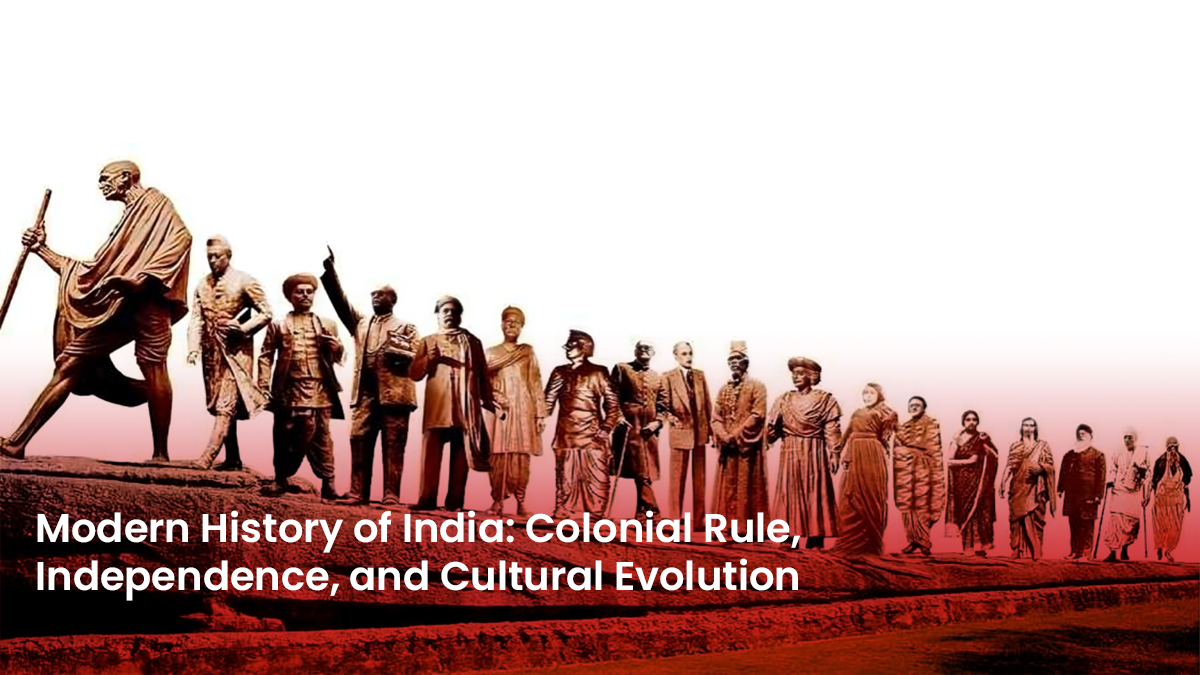UPSC is one of the most popular exams in the country as lakhs of aspirants apply for it each year. Becoming an IAS officer is a dream cherished by millions of young Indians, driven by the purpose of making a significant impact in the field of administration.
However, preparing for an exam of this magnitude requires diligent work and immense passion to ensure success. It is crucial to be thoroughly informed about all aspects of the UPSC exam full form.
To assist you with this, we will be discussing in detail everything you need to know about the UPSC full form, its functions, notifications, exam pattern, syllabus, job profile, salary, booklist, admit card, question papers, results, and more.
What is the full form of UPSC?
The UPSC full form is the abbreviation of the Union Public Service Commission. It is one of the central organizations in the country responsible for conducting prestigious examinations for public service. One such examination is the Civil Services Examination (CSE). There is a provision for the UPSC in the Constitution of India which was formed to assist the government in handling such services in a more fair and transparent manner.
Understanding UPSC ka full form in English even helps us better understand the role it plays in recruiting a large number of officials for higher posts within the government. The main functions of this commission are to select suitable candidates for the Indian Administrative Service (IAS), Indian Police Service (IPS), Indian Foreign Service (IFS), and other central services. The commission has so much responsibility in shaping the administrators and leaders of India which is why there are high standards on the selection process and competitive exams.
Importance of the UPSC exam
The UPSC examination is much more than an examination as it encompasses a system of selecting a country’s leaders, the term stands for Union Public Service Commission exam. The UPSC examination is conducted in importance as follows:
- It aids in selecting the right candidates for the most important government positions
- It helps in ensuring that there is no favoritism during recruitment
- It enables citizens to serve their country and bring about positive changes
Key examinations conducted by UPSC
The Union Public Service Commission (UPSC exam full form) conducts several key exams in India. These exams follow a specific UPSC exam pattern to select candidates for prestigious government positions. Here are some of the key exams:
- Civil Services Examination (CSE)
- Indian Forest Service Examination (IFoS)
- Engineering Services Examination (ESE)
- Combined Medical Services Examination (CMS)
- Central Armed Police Forces (Assistant Commandants) Examination (CAPF)
- Naval Academy (NA) and (NDA) National Defence Academy Examination
- Combined Defence Services (CDS) Examination
- Special Class Railway Apprentice (SCRA) Examination
- IES (Indian Economic Service) and Indian Statistical Service (ISS) Examination
Important dates for UPSC Civil Services Examination 2025
Understanding the UPSC full form is important if you are an aspirant preparing for government exams. The UPSC exam pattern consists of mainly three stages in the exam: Prelims, Mains, and the final Interview. Here are the key dates you need to know for the 2025 UPSC Civil Services Examination:
|
Event |
Date |
|
Notification release |
January 22, 2025 |
| Application form start date |
January 22, 2025 |
|
Last date to apply |
February 11, 2025 |
| Prelims exam date |
May 25, 2025 |
|
Mains exam date |
August 22, 2025 |
| UPSC admit card release date |
Early August 2025 |
Here are the important exam dates for UPSC in 2025:
|
Exam name |
UPSC exam prelims date |
UPSC exam mains date |
|
Civil Services Examination |
May 25, 2025 | August 22, 2025 |
| Indian Forest Service Exam | June 15, 2025 |
September 20, 2025 |
|
Engineering Services Exam |
June 30, 2025 | October 5, 2025 |
| Combined Defence Services Exam | July 10, 2025 |
November 1, 2025 |
|
National Defence Academy Exam |
July 25, 2025 |
November 15, 2025 |
UPSC syllabus explained
The UPSC conducts tests for the recruitment of candidates in various positions in the government. The UPSC syllabus prepares a candidate for testing his knowledge, aptitude, and analytical abilities for a post. Below you can find the detailed explanation of the required UPSC syllabus:
|
Stage |
Subjects covered |
|
UPSC exam pattern for prelims |
General Studies, CSAT |
| UPSC exam pattern for mains |
Essay, General Studies, Optional Subject |
|
UPSC exam pattern for interview |
Personality test |
UPSC prelims syllabus
- Indian history and freedom struggle
- Indian Constitution, governance, and current events
- Environment and biodiversity
- Science and technology basics
UPSC mains syllabus
- Indian culture and heritage
- Social and economic issues
- Governance and international relations
- Ethics and integrity
- One optional subject (like Geography, Public Administration, or Literature)
Key Information about UPSC
Besides understanding the UPSC full form, knowing more details about it like UPSC subjects and UPSC age limit is crucial. Let us look at all those details here:
UPSC subjects
The UPSC exam includes a combination of various subjects, both compulsory and optional. Here is a list of detailed UPSC subjects given below:
Compulsory UPSC subjects
- General Studies Paper I-IV
- Essay
- Qualifying Language Papers
Optional UPSC subjects
- Agriculture, Anthropology, Botany, Chemistry
- Civil Engineering, Commerce & Accountancy
- Economics, Electrical Engineering, Geography
- History, Law, Management, Mathematics
- Medical Science, Philosophy, Political Science
- Psychology, Public Administration, Sociology
- Statistics, Zoology, and many more
UPSC age limit
UPSC age limit for the candidates preparing for the UPSC exam vary depending on the category of the candidates, here is the detail about it:
|
Category |
Age limit |
|
General |
21 to 32 years |
| OBC |
21 to 35 years |
|
SC/ST |
21 to 37 years |
| PWD |
21 to 42 years |
Note: UPSC age limit for general category candidates includes, the age limit is 21 to 32 years. This means candidates must be at least 21 years old and not older than 32 years on the 1st of August of the exam year.
Candidates can apply for UPSC online for UPSC exams through the UPSC official website upsc.gov.in. The website provides detailed instructions on the application process, necessary documents, and fee payment. Here is the detailed process on how to apply for UPSC online
- The first step is to visit the official site of the UPSC portal, i.e., upsc.gov.in
- Look at the latest notification of the UPSC examination announcement
- You need to then click on the tab ‘Apply Online’
- You must enter your details like name, qualifications, and address
- You have to upload your photo, fill in your signature, and other necessary documents
- You need to pay the application fee
- Fill up the form and submit it while keeping a copy for future use
UPSC results
UPSC results are also published on the official website of the UPSC, upsc.gov.in. Here’s a simple step-by-step guide:
- Visit the official website upsc.gov.in
- Click on the “Examination” tab
- Select “Active Examinations”
- Find the relevant exam and click on the result link
- Enter your roll number to view your result
Essential books for UPSC preparation 2024
A well-structured study plan and the right resources are necessary to prepare for the UPSC examination. Here is a list of some important books that can significantly enhance your preparation. The UPSC full form, Union Public Service Commission, conducts one of the most challenging exams, and these books are highly recommended for each stage of preparation:
|
Subject |
Book title |
Author/Publisher |
|
History |
India’s Struggle for Independence | Bipan Chandra |
| Ancient India | R.S. Sharma | |
| A Brief History of Modern India | Spectrum | |
|
Geography |
Certificate Physical and Human Geography | G.C. Leong |
| Oxford School Atlas | Oxford | |
| Fundamentals of Physical Geography (NCERT) | NCERT | |
|
Polity |
Indian Polity | M. Laxmikanth |
| Introduction to the Constitution of India | D.D. Basu | |
|
Economy |
Indian Economy | Ramesh Singh |
| Economic Survey | Ministry of Finance | |
|
Environment |
Environment and Ecology | Majid Husain |
|
Science & Technology |
Science and Technology in India | TMH |
|
General Studies |
General Studies Manual | Arihant |
These books include virtually all subjects pertinent to the exam of UPSC. Current affairs need to be followed with periodic reading of newspapers as well as the monthly magazine on a regular basis.
Just carrying the right study material is not complete preparation, but these books will just suggest books and are definitely not obligatory books to be read. Constant studying with practice and revised notes help through the UPSC examination.
UPSC admit card and results
Once you have applied, you will need the UPSC admit card to sit for the exam. You can download it from the official website after logging in with your details.
Once the exams are over, the UPSC result is declared. Checking the result in time is important to know your next steps.
The UPSC result will contain:
- List of selected candidates
- Cut-off marks for each category
Tips for preparing for UPSC exam
- Preparing for UPSC may seem hard, but these tips will make it even easier:
- Know the UPSC exam pattern like how much is asked in Prelims, Mains, and the Interview
- Schedule time for each subject
- Read the right material-the NCERT books and guides like Laxmikanth for Polity
- Stay updated by reading the newspaper daily to know what’s happening
- Practice the art of writing in Mains, and write essays and answers
- Never forget to revise the material studied
Wrapping up, and knowing the UPSC full form and everything about the UPSC examination is essential for every candidate who wants to clear the exam. The Union Public Service Commission, or UPSC ka full form in English, is the body that supervises some of the most challenging and prestigious exams in India.
With the right resources and the correct application, the UPSC exam can be attempted. Stay focused, use appropriate books, and keep in mind the important dates to ensure that you are well-prepared for each stage of the process.
Best of luck and stay focused on your journey to becoming a civil servant!

























